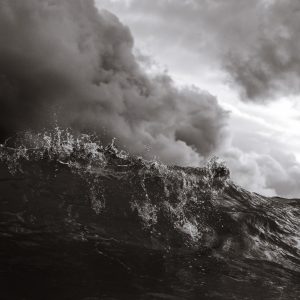Standing beneath the overhead canopy of a Phillips 66, out of the desert sun, Delbert opened his wallet to take out the department credit card. He hesitated and withdrew Stella’s photo, her blond hair and piercing blue eyes smiling up at him. But all he could hear was her scornful, “Did you have to eat it all?” His shoulders slackened as he slid the photo back in place. Using the credit card, he began pumping unleaded into the Rio Salvaje Sheriff’s Department Chevy Tahoe. His wallet rested on the hood and he reconsidered. It had been months. He pulled the picture from the plastic sleeve, winking blue eyes and all, and tossed it into the trash.
“Hey, Deputy.”
Delbert turned to see a grizzled Navajo cop with a Marine Corps crewcut. The man strode toward him from a tribal police vehicle at the other pump island, hand outstretched.
“Why the long face?” the cop asked.
“Just having a day,” Delbert responded, stepping over to shake his hand. “Delbert Guerrero.”
“Wilson Yazzie.” He paused. “Delbert Guerrero? Did you have a dad…” he stopped, considering, then shook his head, “no, a grandfather, working for your agency?”
“Yeah,” Delbert grinned. “Also Delbert Guerrero, I even got his badge.”
“Well, Big Boy,” Yazzie said. “Not a lot of family resemblance. Your grandfather was tall and fit and…” He ruminated, rolling words around his mouth like a giant gumball, the way old men did as they thought. “Well, you’re not.”
Delbert opened his mouth to say something but closed it again. At five foot six and two hundred and twenty pounds, it wasn’t the first time he’d heard that and at thirty, he still had time to lose his baby fat. Explaining that he was taller than anyone in his mom’s family and happened to be big-boned never seemed to satisfy anyone.
Yazzie continued, “Well, hopefully you’re just as good a lawman. Your grandfather took care of business.” Yazzie nodded as he spoke. “He was a real hard charger.”
“Yeah, he was,” Delbert agreed. The pump behind him clicked off and he excused himself to return the hose, collect his receipt, and climb into the truck. He waved to Yazzie as he drove off, back into the Chihuahuan Desert. As far as he could see, it was little more than rocks, dirt, and grass interspersed with shrubs and a very occasional pine reaching out of the hills and valleys. Tooling down Interstate 750 to the south, Delbert came very close to leaving Rio Salvaje and entering Sandoval. To stay inside his own jurisdiction, he turned left onto New Mexico 737, and then cut right onto County Road J13.
His thoughts kept returning to the conversation, trying to decide which snarky retorts he should have used. During his twenty-minute drive, he had come up with several, but that was the problem with clever comebacks-they were never there when you needed them, at least not for Delbert. Grandpa would have known what to say.
Pulling back from thoughts of an exchange with Yazzie that would never happen, Delbert realized habit had brought him to Arroyo Escondido. An accidental discovery by some of Francisco Coronado’s men, the Arroyo had been their refuge after getting lost searching for Cibola, one of the fabled Seven Cities of Gold. A long, narrow ravine that ran for over seven miles, it was blessed with near-constant shade and water bubbling up from an underground river. Now, it was a favorite location for drug smuggling, at least that’s what rumors suggested.
Whenever he was down in this corner of the county, Delbert drove past the Arroyo, but all he ever found were underage kids drinking, illegal campers, the occasional cluster of thrill-seeking dirt bikers. Today, though, nothing but scrub grass and desert flowers waving in the gentle breeze, and agave and opuntia cactus reaching for the sun. Just landscape.
He sighed. Hours of absolute boredom, his grandpa used to say, punctuated by moments of sheer terror: that’s police work. Well, Delbert certainly had the hours of absolute boredom down. Nothing exciting ever happened on his shift. Delbert had long ago figured out how not to fight with suspects; identify the bad guy, obtain a warrant, let the warrants guys handle it from there. No reason to get hurt if you could avoid it.
Cutting down the fire road that ran North, Delbert slowed to manage the bouncing of the cabin, the SUV rolling over hills, dunes, and eskers. The vehicle rattled and groaned, equipment bumping and jostling within the racks and holders. It had been a mild October in the New Mexico desert and Delbert drove with the window down, the cool air blowing his prematurely thinning hair in a rakish sort of way. At times like this, it was easy to pretend he was the handsome, leading man type, like his grandpa. The engine revved, pushing up over a slight knoll covered in scrub and rocks, when he heard the first pop, pop, pop. Delbert slammed on the brakes and strained, listening for more over the rumble of the engine.
Pop, a pause, and then pop, pop, pop. Definitely gunfire, coming from the direction of the Arroyo. Butterflies exploded in his gut as a quick flush of adrenaline coursed through his veins. Probably just some kids plinking at bottles, he thought, taking a deep breath. But he should check. Reaching over to the passenger seat, he pulled his black, cowboy hat off the hook and placed it on his head, to protect his receding hairline from the sun. Wouldn’t want to get skin cancer, he thought. Not on the way to a shooting.
He turned the Chevy toward the higher ridge that marked the leading edge of Arroyo Escondido and grabbed the car radio.
“County, this is David Eleven, I’m responding to gunfire on the North side of the Arroyo Escondido. Checking it out.” He kept his voice as calm and level; just kids plinking at cans, he reminded himself.
“Copy David Eleven. Are you requesting additionals?”
“Not at this time, County.” He clipped the radio back onto the console.
About a half mile from the Arroyo, a wave of people spilled over the ridge. Delbert’s mind struggled to make sense of what he was seeing, and then it clicked. Illegals. Based on their clothes alone, they had to be. Some ducked for cover behind shrubs; others ran flat out towards Arizona, miles away. One last man rose over the ridge, carrying a large revolver-was he chasing them?
Delbert hit the overhead lights and activated the sirens as he hit the gas and charged over the landscape, the SUV bucking like a mechanical bull. Assuming the gunman would simply turn and run, Delbert focused on him while grabbing the radio to call for assistance. But the gunman wasn’t shooting.
Another man popped up over the ridge in pursuit, running and shooting wildly, using only one hand. The first gunman turned and crouched, feet planted, weight forward, both hands gripping the pistol in a combat, Weaver stance, firing at the man on the ridge in careful measure, just like the deputies did at the range.
Just like Delbert.
Both gunmen fell. And Delbert had an epiphany as a cold chill ran up his spine. He shouted into the radio, “Shots fired! Officer down! Officer needs assistance!”
Piloting the truck through the shrubs, Delbert fishtailed in the sand and stormed toward the ridge. Another gunshot, fired from the Arroyo, struck his windshield and left a small hole near his sun visor. Bastards shot my car! Rocking forward in his seat, he drew his grandpa’s Colt .45 Army pistol, pointed it at the passenger window and turned broadside to the ridge, firing with one hand. The safety glass cascaded to the sand outside as he barreled toward what he knew in his heart was a police officer down.
The Chevy slid to a halt, positioned between the ridge and the man lying in the dirt. Bullets flew in his direction, striking the passenger side with a dull hammer-like noise. Delbert slammed the vehicle into park. The siren stopped.
Sliding his bulk backwards out of the truck, Delbert lost his balance and fell into the sand, but popped up and continued to fire at targets, both seen and unseen. For once, he didn’t have time to be embarrassed. Dropping a magazine into the sand and drawing another from his belt, he jammed it into the gun. He sidled over to the man on the ground, Hispanic, in his forties, wearing jeans, an Elton John concert T-shirt, and a sand-colored jacket, now covered with blood. Grabbing the jacket by the collar, Delbert pulled the man to a sitting position against the police car’s tire, then took the revolver from the man’s hand and tossed it into the front seat.
“Are you a cop?” Delbert shouted in English.
The man, face contorted in pain, nodded and cleared his throat. “DEA. George Nunez. Undercover,” he gasped. “The damn coyotes started raping the women…” He spat blood onto the sand. “I…I had to…”
A young woman wearing nylon hiking pants and a poncho made from a blanket, ran up and took a shirt from her backpack, holding it to the DEA agent’s chest wound and applying pressure. Delbert looked up and realized that the illegals…undocumenteds, he reminded himself…were all moving into position behind his truck for cover. Sticking his head up, he saw his enemies creeping over the ridge. Firing again, Delbert chased them back into the Arroyo. He saw the man Nunez had shot, lying in the sand, blood soaking into the earth.
Gun empty, Delbert dropped his second magazine to the ground and loaded his last one into the handle of his pistol, snapping the slide shut. With alarm, he saw the woman with the blanket-poncho digging around inside the driver compartment of his truck, where he’d just thrown a loaded gun. He shouted, “What are you doing in there?”
Climbing back out, she presented his shotgun to him, and held the two extra boxes of .45 ammunition that he kept in his beat bag. Delbert took the shotgun and considered asking how she was able to release it from the locked rack, but decided that wasn’t important. He asked her name. She pointed to a long, wide scar that ran from her right ear, across her throat, and ended at her left collarbone, then shook her head. Another vicious scar started at the corner of her mouth and ran back toward her left ear, giving her a permanent, awkward smile. About twenty-five and pretty, Delbert thought, but someone had tried to fix both those things. As he stared at her, she began sliding bullets into his empty magazines.
“Marisol Garcia Gallegos,” Nunez wheezed, blood bubbling in his mouth. An elderly man was applying pressure to the wound. “CNN profiled her. Chief of Police of Del Lobos at twenty-two years old. She stood up to the cartels. They killed her family, raped her, left her for dead.”
Delbert glanced down at Marisol, who was now slipping the magazines into their holders on his belt. He turned and saw men climbing out of the Arroyo again and instinctively, pointed the shotgun and fired. Racking and firing, he swept the hillside until the last casing ejected. The men ducked back into cover. Marisol handed Delbert shells to replace the ones he’d used and he slid them into the tube magazine with a thunk and a click. Even with his ears ringing wildly, he could hear the faint roll of a siren in the distance. Now, that’s a comforting sound, he thought.
“All we have to do is hold them off long enough for help to arrive,” Delbert told the people gathered around him, switching effortlessly into Spanish. “Just a few more minutes.” He scanned the distant hills. Maybe twenty or thirty, tops, he left unsaid.
“Policia,” a voice called out.
“Go ahead,” Delbert shouted. He lifted his head to look out over the hood of his now disabled police vehicle; bullet holes riddled the passenger side and multiple fluids drained into the dirt. Great, now the state Environmental Department was going to reprimand him.
A young girl, maybe ten, possibly younger, stood at the top of the ridge, arms tight against her body, visibly shaking like a frightened dog.
“We want the federal agent and the police chief,” the voice called out. “Or we kill the girl.”
Delbert watched the girl walk forward a few feet, apparently following an unheard command. He looked over at Marisol, whose bright eyes were full of fire, her jaw clenched and twitching, a silent tear rolling down her cheek. Nunez on the other hand, had slipped into unconsciousness and slumped sideways off the tire.
What do I do? What would grandpa do? Grandpa’d go charging in on horseback, guns blazing, like the cowboy he was. The butterflies in Delbert’s stomach made another lap around his insides as he scanned the edge of the Arroyo, heat rising in yellow waves the same color as the dirt and sand. No way would grandpa allow them to use a little girl as a shield. No way. And he made a decision.
“Marisol, que bueno disparas?” he indicated the shotgun.
She reached out with open hands and Delbert placed the shotgun in them. As they crouched behind the Chevy Tahoe, he climbed up into the cab and dug around in his beat bag until he came back with two boxes of shotgun slugs, solid lead instead of pellets. He handed them to Marisol and watched as she expertly combat loaded them into the long gun.
“Andale dispara,” he told her and drew his pistol. She nodded as he pulled his hat down lower and crouched at the back of the Tahoe, working up his nerve. Delbert focused on properly gripping the pistol and placing his feet beneath him, just right. I can do this, he told himself. Rough rocks and patches of sand with the occasional guayule shrub stretched out ahead of him as he picked his path.
“Ahora,” he shouted, as much for his own benefit as for Marisol’s.
The shotgun boomed over the hood and Delbert ran toward the Arroyo, shooting one-handed, like Robert Conrad in Wild, Wild West, like grandpa would have. The girl stood stone still as he sprinted at her, his bulk imposing as he charged.
“Corre hacia mi!” he screamed in Spanish. The girl bolted, flying across the sand as bullets zipped past. Delbert saw a splash of red from the top of her shoulder and she cried out, but refused to slow down. He guided her with his left hand as she rushed past running toward the police car. Skidding in the dirt and kicking up dust, he arrested his forward momentum and began running backwards. Picking targets on the fly, he felt a bullet strike his vest, and then another. He wasn’t moving fast enough. The third bullet knocked him off balance and he fell.
His hat plopped off his head and he lay flat on his back. The gunshots had not hurt as much as he thought they would. Maybe they hadn’t even touched him, just his vest. More bullets struck the ground around him and some hit the police car in the background with loud metallic smacks. A single bullet struck his foot, tearing away a chunk of leather boot. He didn’t feel that one either. Perhaps he was already dead? Turning his head, he saw the girl lying on the sand nearby, blood soaking her dress-a pretty flower print in blues and yellows. She blinked as their eyes met.
“Todavia puedes correr?” he whispered. He felt blood running down his side toward his back, but it felt cool compared to the heat of the desert floor. Nope, not dead yet.
She nodded.
“When I sit up and start shooting, you run. Don’t stop until you are behind the police car,” he told her and she nodded in agreement.
Slowly, he reloaded his pistol and released the slide. He would not make it to the police car himself, he knew that much, but he could hold them off for a while, until help arrived. That’s what grandpa would do.
Popping up like a funhouse target and firing two handed, he picked his marks and tried his best to hit them, not just keep their heads down this time. Reloading, he dropped back into the dirt; his shirt felt wet and he struggled to breathe. A Chihuahua sage in full purple bloom grew nearby and he scooched his body sideways to put it between himself and the Arroyo. The shotgun boomed and Delbert heard a man’s voice cry out and then scream for what seemed like a very long time. Way to go, Marisol.
Delbert stared up, unsure for how long, his blood pooling beneath him. Every time he heard someone moving across the landscape, he raised his pistol and fired randomly past his boots. This was always followed by a volley of shots in his direction, some striking him, most not. But as the bullets cut through the sage at his feet, he was covered by the lavender blooms torn off and the fragrance of the desert calmed his pounding heart.
A lone cumulus cloud rested above, watching over him. It stretched and condensed, changing shape and darkening slightly, working toward a thunderstorm, perhaps to cry over the death of Delbert Guerrero. Minutes or hours, he couldn’t tell anymore.
“I hope you’re happy, now, Grandpa,” he whispered to the cloud. “I got blood all over my uniform.”
A siren drowned out his thoughts and a white, Ford Explorer, emblazoned with a bright green stripe roared into the line the fire. A grizzled, old Navajo cop with a Marine Corps haircut jumped out and fired at the enemy over the ridge, then turned and opened the back door to his car. Marisol hopped out and the two of them lifted Delbert into the Ford, Marisol pulling him in after her.
“No cavalry for you today, Big Boy,” Yazzie shouted over the returning gunfire. “Only Indians and Mexicans.” He cackled at his joke and slammed the door shut, climbed in and drove them back toward the road.
Sitting at an angle, with his back against Marisol, her hands holding his head up, Delbert could see additional police cars roar past: State Troopers, Navajo Police, Apache Police, Border Patrol, Sandoval County, Salvaje County. A Border Patrol helicopter thundered overhead. Some bad guys were about to have a very, very bad day.
He looked up at Marisol. “The girl okay?”
She nodded.
“Nunez?”
She shook her head. Delbert felt a profound sadness, like a blanket being pulled over his face and covering him-a failed responsibility.
“Looks like I was wrong, Big Boy,” Yazzie shouted over the sound of the sirens. “The family resemblance is there, I just couldn’t see it.” He smiled into the rearview mirror with tobacco-stained, old man teeth. “It was in your blood.”
Delbert had only a faint memory of the helicopter ride to the hospital. Marisol sat beside him, holding his hand. The Air Force paramedic asked if he wanted “lessphine or morphine,” then followed up with “the more the better.” He recognized the University of New Mexico Medical Center when he was wheeled out of the Air Force Pave Hawk and onto the helipad, then taken directly to the trauma center. Before he lost consciousness, he remembered seeing his father in his white coat, standing nearby, watching other doctors care for his only son.
He awoke to a bright and sunlit room. His parents were there: his father, Nestor, tall and classically Mexican, with the aristocratic air of one of the old Spanish dons and his mother, Sabrina, short and round, like him, with the high cheekbones and cinnamon skin of her indigenous ancestors. Delbert was floating, as though an invisible hand had gathered him up and was holding him above the bed, the pain medication working wonders.
“Oh, my baby is awake,” Sabrina gushed, fussing over her only boy.
Nestor interrupted her, letting Delbert know that his big sisters were in the waiting room. “They only allow three visitors at a time,” he said. “You’ve been in the news. They’re calling you a hero.”
It took Delbert several seconds to do the math. “Who else is here?”
Sabrina beamed. “Marisol,” she whispered, indicating a woman sleeping in a foldout chair in the corner. “She hasn’t left your room.”
Marisol stirred, possibly hearing her name, and blinked away the sleep. She smiled with her lips tight together and made her way over to Delbert’s bedside. He felt her cool hand on his forehead as she looked down at him. She held a stuffed animal in her other hand and placed it on his chest. He looked at it and saw that it was a short, round teddy bear, wearing a cowboy hat and badge on his shirt.
Nestor leaned over. “She got you a deputy teddy bear.” He smiled. “Looks just like you.”
“Marisol,” Delbert whispered. “Muchas gracias.”
She placed a hand over her heart. She tried to hide her teeth as she smiled more, but Delbert saw some were broken and others missing and remembered her story.
“Thank you,” he said, again. “Thank you for saving my life.”
Marisol blinked back some tears and reached down, taking his hand, squeezing it tight, while Sabrina hovered nearby trying to suppress a smile.
In the hospital room, illuminated only by the light from the hallway through the open door, Delbert opened his eyes to the sound of a voice. Looking up, Delbert saw a man standing over him, a man he had only seen in photographs. He was young, maybe thirty, and six feet tall or more, with a lean, angular face, a thick, Sam Elliot mustache, and wearing a Stetson, badge, and old Army, Colt .45 Auto in a holster. When he saw Delbert’s eyes open, he smiled, teeth brilliant in the dim shadows.
“Boy,” the man said, in a low, gravelly voice. “I never wanted you to get blood all over your uniform.” He laughed and set the Stetson down on the empty chair beside the bed.
Delbert struggled to find his voice, but no sound came.
“You did good today.” The man patted Delbert on the forehead, then pointing at the sleeping Marisol with his sharp chin, said, “You did good.” He winked and smiled and then walked out of the room into the hall, disappearing from view.
In the morning, when Nestor came in from rounds to check on him, Delbert fought hard to recall the details of the dream of his grandfather.
“It was crazy, Dad,” Delbert told him. “I swear I could even smell his aftershave.”
Nestor smiled at his son. “That would be just like your grandfather.” Then he cocked his head slightly and knitted his eyebrows. “Delbert? Who left your grandfather’s hat in that chair?”




